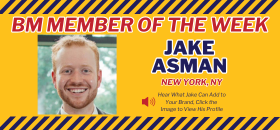In 1992 I was a senior about to graduate from the University of Illinois. I met with a friend of the family, who at the time was the Chicago based producer for The Today Show to get some career advice. He said that I needed to figure out if I wanted to be on the air or work behind the scenes.
Most of us at that age can only think if being on the air, which is what I told him. He said it’s really difficult but if I wanted to be on the air, I’d have to move to a small town, make no money and work a ton. Then eventually if I was good enough, I would move up in market size and the pay and the workload would improve.
I took that attitude into my career, which ended up primarily off the air– Associate Producer, Producer, Executive Producer, Sports Director and Program Director. Whenever interns or college students wanted my advice about their career I would ask them the same question—do you want to be on the air or work behind the scenes? If they said on-air, I told them to put together a great tape, network, and be willing to move anywhere in the country to get on the air. If they wanted to work behind the scenes, they could find work in a major market and work their way up.
When I look back, the advice sounds good, but it’s just not based in reality. In fact, I have worked with a ton of excellent hosts who started out as producers—Dan McNeil, Jonathan Hood, Laurence Holmes, Jeff Dickerson, Mike Babchik, Jason Goff, and Matt Spiegel and that’s just scratching the surface.
I spoke to Matt Spiegel who produced at the Score and WXRT in Chicago and has hosted at Sporting News Radio and back at the Score beginning in 2009:
“I firmly believe nothing gets you better prepared to do it every day than watching your hosts do it. You’ll see habits you admire and habits you don’t. Then once you start hosting you’ll find yourself doing some things just like them, but you’ll also realize how you want to be different. Everything will feel a bit reactionary. Maybe you ask shorter questions because they asked frustratingly long ones. Maybe you prep a little more in terms of show structure because you thought they were a bit too loose. The things you choose to do differently are the ones to really pay attention to and develop, because the goal is to be yourself.”
Travis Rodgers was one of the more famous talk show producers in America. He produced The Jim Rome Show from 1996-2009. He has gone on to host nationally and in major markets and is currently a host at ESPNLA 710. He talks about the advantages and disadvantages of moving from being a producer to being a host:
“As far as the challenges of making the transition from producer to host, the toughest part was finding someone to give you a chance to get behind the mic full time. People see you in one role and sometimes have a tough time seeing you in another. As for the advantages, I don’t think you ever stop thinking like a producer. You prepare like a producer, look for stories like a producer, and think of booking guests like a producer. It also helps forming a partnership with your producer. You know the challenges; you know what they’re up against and can help solve some of the issues.”
Here’s my new advice: If you want to be a sports radio host you can go a number of different routes. You can go to a small market and get on the air and develop your style; or it may serve you well to work at a major market or national sports talk station as a producer.
Matt Fishman is a former columnist for BSM. The current PD of ESPN Cleveland has a lengthy resume in sports radio programming. His career stops include SiriusXM, 670 The Score in Chicago, and 610 Sports in Kansas City. You can follow him on Twitter @FatMishman20 or you can email him at FishmanSolutions@gmail.com.








